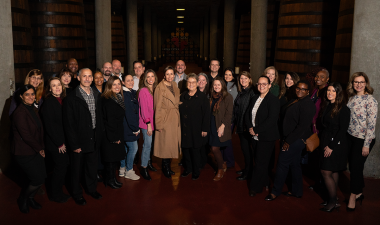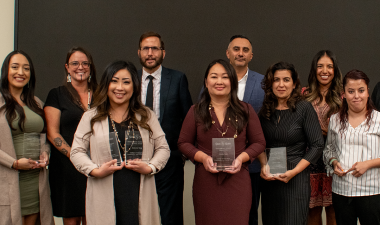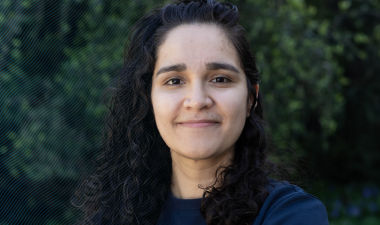Growing up in the small farming town of Delhi and attending Hilmar High School, Julio Pimentel never expected to be a cancer researcher discovering new ways to target aggressive and treatment-resistant forms of the disease while winning dozens of accolades for his work.
He just knew he wanted to be like the rest of his friends — headed to college. But as the son of Mexican immigrants who worked in agriculture and had no experience with higher education, he was lacking guidance at home on how to make his college dreams come true.
“We were low-income, and my parents did not have high school educations,” said Pimentel, a fourth-year doctoral candidate in Wayne State University School of Medicine’s cancer biology program in Detroit. “So, the trajectory from where I started to where I am now — doing cancer research — it is such a huge contrast, and it all started at Stanislaus State.”
It started in the Stan State Admissions Office, to be exact. Early in Pimentel’s junior year of high school, he visited the campus and a counselor in the Admissions Office explained the application process and requirements for acceptance. He took the information home and used it as a road map for the remainder of his high school years, being sure to maintain his grade-point average and take the required classes and exams. The summer before his senior year of high school, he applied to Stan State and was accepted.
“I applied at Stanislaus State because it was near my home, and I just couldn’t afford to go to other universities,” he said. “It turned out to be a great choice. It provided me with a good foundation to pursue graduate programs at other universities, and I didn’t struggle as much as I thought I would. My Stan State training prepared me to be competitive with students from Harvard, for example, and other top schools.”
By the time he started at Stan State, Pimentel had already developed an interest in cancer research. As a volunteer — and later a certified nursing assistant — at Emanuel Medical Center in Turlock, he got to know cancer patients and frequently used his bilingual language skills to translate for those who only spoke Spanish.
“I saw how horrible cancer was for patients, and I started thinking about why people get cancer, why some cancers respond to therapies and why others don’t,” he said. “I just wanted to develop better treatments for patients, so I decided to major in biology to get the foundation for a career in cancer research.”
After earning a Bachelor of Science in Biological Sciences from Stan State in 2014, Pimentel graduated with a Master of Science in Clinical Research and Translational Medicine from the University of Miami Miller School of Medicine and completed two years of post-graduate training in translational medicine at Harvard Medical School.
At Wayne State, he is employed as a graduate research assistant and lab manager in the Department of Oncology at the Barbara Ann Karmanos Cancer Institute while he works on his Ph.D. His research focuses on various types of resistance in breast, gastrointestinal, pancreatic and ovarian cancers with the goal of contributing to and developing strategies to overcome the resistance. His long-range plan is to become a leading cancer expert and direct a major research program while serving as a mentor and encouraging students of diverse backgrounds to pursue STEM careers.
His recent work on overcoming tumor necrosis factor-related apoptosis-inducing ligand, or TRAIL, resistance in triple negative breast cancer led to important findings that can be used to develop new therapeutic strategies and more effective treatments. It also led to him receiving for the second year in a row a National Latino Leader Award with a scholarship to present at the 2021 Society of Advancing Chicanos/Hispanics and Native Americans in the Sciences Conference.
Over the course of his training, Pimentel has received about 40 honors, including a 40 Under 40 in Cancer Award for 2021, a Profiles in Warrior Strong award from Wayne State for his work through the pandemic and a letter from the governor of Michigan commending his contributions to health care in the state.
Pimentel says he loves the work he is doing and is often amazed that he is on the frontline in the battle to cure cancer.
“I get such a sense of satisfaction when I look at a plate (under the microscope) and see from the first day to the second day that cancer cells are dying,” he said. “To see treatments working, especially for the really aggressive cancers, just makes me feel like a hero. I can’t believe I am figuring it out, and it just feels great.”
Mentorship Leads to Success
Pimentel has had many mentors throughout his career, and he credits them as keys to his success. Other keys, he says, are not being shy about asking for help or information, taking constructive criticism and advice with a good attitude and always working hard.
Some of the faculty he credits for influencing and mentoring him while he studied at Stan State include Lecturer Jennifer Cooper, Professor Terry Jones and Professor Janey Youngblom, all in biological sciences; Professor Nimalie Tamara Littlewood and Professor Koni Stone, both in chemistry; and Professor Susan Mokhtari in physics. Pimentel says they did more than teach him academic content; they educated him on the steps to become a cancer researcher: how to prepare for and apply to graduate school and how to improve his academic and presentation skills.
Cooper, who has kept in touch with Pimentel over the years, says she is “tremendously proud” of his accomplishments and not surprised by his success.
“He was always strongly motivated by curiosity and a desire to understand more about the big questions in biology and medicine,” she said. “He was a hard worker, constantly going above and beyond to learn more about subjects that interested him. He investigated several research topics while he was an undergraduate, and each time I was impressed with the quality of his work and the depth of his understanding.”
As Pimentel’s mentor, Cooper said, she provided guidance, and he did the rest.
“All of his success is due to his own fine intellect and work ethic,” she said. “As a mentor, I simply pointed out a pathway, and he took it upon himself to make the journey.”
With a firsthand understanding of the importance of guidance, Pimentel says he is determined to always serve as a role model and mentor to young students while advancing diversity in the STEM fields, particularly in cancer research.
“There is so much opportunity for first-generation, Hispanic, Black and other students of diverse backgrounds in the cancer field,” he said. “There is laboratory research, clinical trials, even cancer awareness and psychology.”
His advice for students who come from a background like his: “Work hard, don’t get discouraged and always seek help when you need it because there are a lot of people out there who want to help you succeed. And don’t think that you are not smart enough. When you work hard, you learn and intelligence develops over time.”


